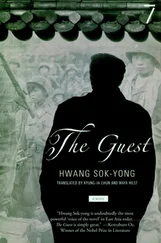“There, now. It’ll be morning soon. Then it won’t be as cold.”
The wind whistling through the trees grew stronger and we heard a groan, like a huge wave bearing down, just before the storm crashed in on us without mercy. Our roof of woven branches flew off. Snow piled up on our blankets and threatened to bury the entire hut. Father sprang up and groped around in the dark for the tree branches and empty fertilizer bags that had served as our roof, but it had all blown away already. He began scooping up snow with his bare hands and tossing it outside, but soon gave up. The snow coming in was much greater than what he could dig out with his hands. When my blanket got so heavy that it was pressing down on my small body and making it hard to breathe, I crawled out and helped Grandmother scoop up the snow with a bowl and our cooking pot. Then I got back under the blanket, rubbed my hands together and tucked them into my armpits to warm them. My teeth chattered.
The snow didn’t start to die down until close to dawn, and finally stopped completely when the sun rose. Our beloved hut was in a gruesome state. The storm had passed, but the wind was still strong enough to turn the snow that had accumulated on the tree branches into a fine, white powder that hung in the air. Father ran around cutting branches while Grandmother and I collected them and dragged them back to the hut. We were able to do some makeshift repairs.
When the roof flew off again a few days later, Father despaired. He could have taken more of the vinyl sheeting the farmer would need in the spring to rebuild his greenhouses and used it to build us a roof strong enough to last for years — but he would sooner have taken us back to the farmer’s house and begged him to let us move back in. Father said generosity was like cooked rice: the longer it sat out, the faster it spoiled. In other words, if you kept imposing on people, then when you really needed their help later they would turn their backs on you. Grandmother nodded.
That day, the three of us were so busy clearing away the snow, shaking out the blankets and rebuilding the roof that we forgot all about Hyun. Father tied branches together with plastic twine to form a frame and wove leafy branches into it, while Grandmother dug out the dry branches and twigs for kindling that had been stacked beside the entrance to the hut, shook out all of the snow and used the wood to get the fire restarted. The smell of the wood burning made me feel warmer already. When we were sitting inside the hut, our breath white in the air, Grandmother finally realized that Hyun was gone.
“Where did little Hyun go?” she asked.
She checked under all the blankets, and Father groped around every corner of the hut. We went outside. Father searched all around and found Hyun in a thickly wooded area filled with large trees. She was lying on her side, curled up tight like a dried anchovy. Father picked her up and Grandmother stayed by their side, shaking her head.
“Wake up, child!” she said.
Hyun stayed curled up as though frozen in place. We brought her into the hut, placed her under the blanket and rubbed her hands, feet and legs. She opened her eyes and stared at us as if she’d just woken from a long sleep.
“What were you doing out there in the cold?” Grandmother asked.
“I had to pee …”
“You should’ve come back right away. You almost froze to death!”
Hyun closed her eyes and didn’t respond. She looked like she was sleeping. Father kept rubbing her hands and feet.
“Mother,” he said urgently, “she’s not warming up. Heat up some water and feed it to her.”
Grandmother went outside, filled the cooking pot with snow and boiled it on the stove. Then she filled a small bowl with warm water and held it up to Hyun’s mouth, but Hyun only sipped enough to wet her tongue a little and went limp again. We unpacked our belongings and pulled out all the clothes — which were frozen stiff — and squeezed, rubbed and sat on them until they were filled with our body heat. Then we piled them on top of Hyun and wrapped the blanket around her. The fire had built up nicely. The cardboard that covered the floor stones was starting to warm up. But a very soft, smoke-like something hovered darkly over Hyun’s body. I didn’t know what it was, but I was afraid to get any closer or to try to make it go away.
Hey, Big Sister , I thought to her, I know you’re trying to leave us .
We tucked our legs under the blanket and dozed off where we sat. Sometime in the night, Hyun passed. She’d grown too weak, and couldn’t bear the cold. But none of us — not Father, Grandmother or I — shed a single tear. Father wrapped her small body in several layers of clothes and fertilizer sacks. As he left the hut with Hyun, he narrowed his eyes at us.
“Don’t follow me!”
*
Winter passed, and bright green shoots poked up through the gaps in the lingering snow. Grandmother and I went down the mountain to pick the greens that had just begun to grow along the edges of the fields and the ridges of the paddies that had not yet been ploughed up. All we had was some salt and a little dwenjang that the farmer’s family had given us, but when we boiled the greens and seasoned them with the dwenjang or made them into a soup, the fragrant scent of the greens complemented the deep flavour of the fermented bean paste, and made for a perfect meal with a bowl of rice. And of course that was white rice we were enjoying!
Father did some work for the farmer’s family and returned with a sack of wheat flour — not the earthy, brown flour we were used to, but a strange variety that was as white as snow. Grandmother ground up mugwort shoots and added it to the flour to make dough, and then roughly moulded the dough into small, flat gaetteok cakes and steamed them.
One morning Father put on a thick, padded coat over his faded Mao suit, just as he used to do before heading off to work; he tightened the laces of his shoes and left home. I knew instinctively that he was heading out on a long journey. He stroked my head for a moment and then quickly pulled his hand away and coughed drily.
“Bari,” he said, “I’ll be back in a few days. Take care of your grandmother.”
“Where are you going?”
He didn’t answer me, and turned to Grandmother instead.
“Mother, it’ll take about five days. There’s plenty of food. Should last you at least two months, so don’t starve yourself. Eat as much as you want.”
Grandmother and I stood there in silence as he left. I wanted to follow him down the mountain and all the way to the road through the orchard, but I knew he would only narrow his eyes at me and say: “Aren’t you too old for this?” So I stayed by Grandmother’s side. Father quickly disappeared amongst the trees. Grandmother must’ve seen that I was feeling down and wanted to distract me. She patted me gently on the back and whispered: “Bari, look over beneath that tree. Pheasants!”
Indeed, a male pheasant with golden feathers, a blue band around his neck and a proud tail sticking straight up was cocking his head this way and that, while a female with a round, grey belly was foraging through the dry underbrush in search of something to eat. It never fails that once someone is out of sight, your thoughts of that person leave with them. It felt like ages had already passed since Father had spent the winter with us. Just as I now only saw my mother and two sisters who’d left for Puryong in my dreams, my father’s leaving was like a spot in the sky where a cloud had just passed.
On nights after we’d steamed potatoes and cooked rice and finished our dinner, and owls were hooting in the woods, I would plead with Grandmother to tell me stories. Listening to her old tales made me feel like I was back in that house with the wide courtyard at the top of the hill in Chongjin. My sisters would be playing cat’s-cradle or a clapping game in the room on the other side of the house, and any moment now our mother would come out of the kitchen with a basket of gaetteok that she’d steamed in the cauldron or sulppang leavened with alcohol, and I would hear her call out merrily: “Girls, come have some snacks!” I could hear my sisters laughing in delight as they thumped across the floor.
Читать дальше












